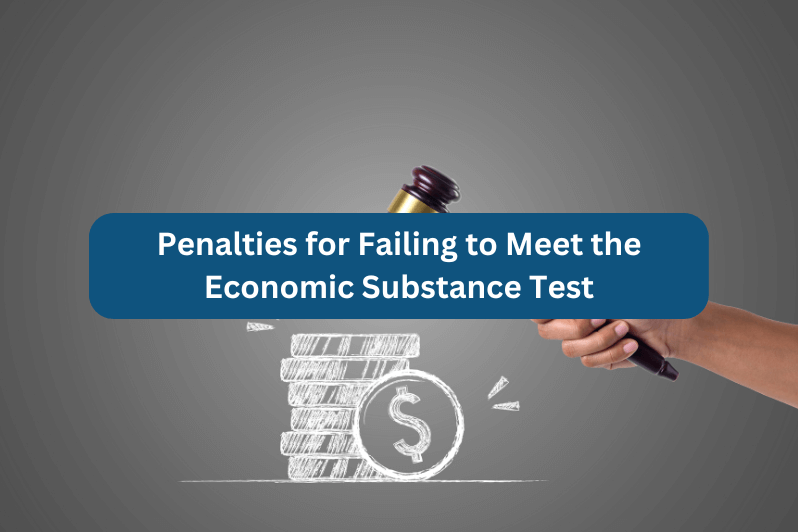The United Arab Emirates (UAE) has implemented Economic Substance Regulations (ESR) to ensure that companies operating in the UAE have a genuine economic presence and are not just using the country as a tax haven. The ESR requires companies to demonstrate that they have adequate substance in the UAE by meeting certain criteria, such as having a physical presence, employees, and expenditure in the country. Companies that fail to meet these criteria are subject to penalties under the ESR.
Penalties for Failing to Meet the Economic Substance Test
Companies that fail to meet the Economic Substance Test are subject to penalties under the Economic Substance Regulations. The penalties for failing to meet the Economic Substance Test are as follows:
Administrative Penalty of AED 50,000
A company that fails to meet the Economic Substance Test for a particular financial year is subject to an administrative penalty of AED 50,000. This penalty is imposed for each financial year that the company fails to meet the Economic Substance Test.
Administrative Penalty of AED 400,000
If a company fails to meet the Economic Substance Test for two consecutive financial years, it is subject to an administrative penalty of AED 400,000. This penalty is in addition to the penalty of AED 50,000 for each financial year that the company fails to meet the Economic Substance Test.
Suspension, Revocation, or Non-renewal of License
In addition to the administrative penalties, the National Assessing Authority may impose other administrative actions on a company that fails to meet the Economic Substance Test. These actions may include the suspension, revocation, or non-renewal of the company’s license.
Notice of Failure to Meet the Economic Substance Test
If the National Assessing Authority finds that a company (Licensee or Exempted Licensee) has not submitted an Economic Substance Report or necessary documents or has not met the Economic Substance Test for a financial year, they must issue a notice to the company. The notice should include the following information:
- The company has not met the Economic Substance Test for that financial year.
- The reasons for this determination.
- The amount of administrative penalty imposed on the company.
- The due date for the penalty should be at least 30 business days after the notice is issued.
It is important for companies to take this notice seriously and respond promptly to avoid further penalties or legal action.
Exchange of Information with Foreign Competent Authorities
The UAE has signed several international agreements, treaties, and similar international arrangements to exchange information with foreign competent authorities. If a company fails to meet the Economic Substance Test, the relevant information relating to such company will be provided to the Foreign Competent Authority of the country or territory in which resides the Parent Company, the Ultimate Parent Company, and the Ultimate Beneficial Owner of the Licensee.
Disclosure of Information
The employees of the Competent Authority, the National Assessing Authority, the Regulatory Authority, or any other ministry or government authority may disclose any data, information, or documentation disclosed to them or within their custody by carrying out their duties assigned to them following the provisions of the Economic Substance Regulations.
Period for Imposition of Penalty for Failure to Meet the Economic Substance Test
The National Assessing Authority may not impose an administrative penalty for failure to meet the Economic Substance Test after the lapse of six years from the date on which the violation was committed. However, in the case of providing inaccurate information, the period for imposing the penalty is reduced to twelve months from the date on which such violation came to the attention of the National Assessing Authority. It is important to note that these periods do not apply if the Licensee or Exempted Licensee has committed fraud that has resulted in the inability of the National Assessing Authority to impose the administrative penalties within the stipulated period
Right of Appeal against Penalty for Failure to Meet the Economic Substance Test
A Licensee or an Exempted Licensee upon whom an administrative penalty is imposed for failing to meet the Economic Substance Test has the right to appeal against it. The appeal must be made on any of the following grounds:
- The Licensee or Exempted Licensee did not commit the violation attributed to it.
- The administrative penalty imposed is not proportionate to the violation.
- The administrative penalty imposed exceeds the limited prescribed.
The National Assessing Authority will publish the rules for appealing, including how to file an appeal and how decisions will be communicated, including the mechanism for filing an appeal and other procedures relating to its review and decision about an appeal and means for notifying its decisions to the Licensee or the Exempted Licensee. The right of appeal does not automatically suspend the payment of the administrative penalty. However, the company can request a stay of execution of the penalty while the appeal is being reviewed. This request should be made to the National Assessing Authority, which will decide within a reasonable time frame.
In conclusion, failing to meet the Economic Substance Test in the UAE can result in significant penalties, including fines and potential suspension or revocation of a company’s license. Companies must ensure they are in compliance with the regulations to avoid these penalties. One solution for companies is to seek the guidance of economic substance regulations consultants who can help them navigate the complex requirements and ensure they are meeting the necessary criteria. By working with a trusted advisor, companies can mitigate their risk of non-compliance and focus on growing their business in the UAE.

